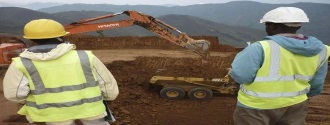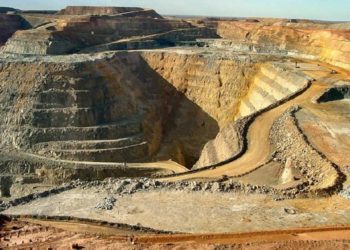The Democratic Republic of Congo’s state-owned copper miner is on track to deliver its lowest output since 2004, the year after Africa’s biggest war ended.A shortage of power low-grade ore and equipment breakdowns hurt output.
In the first nine months of the year Gecamines produced a fifth of the metal it targeted at the start of 2014, according to the company’s production results.
Shipments this year were as low as 428 metric tons in April, after a dispute with Congo’s state-owned power utility, and as much as 1,820 tons in March.
“Since September we’ve put in place a rehabilitation program, which included looking at our internal finances to ensure that we’ll meet our goals in 2015,” interim Chief Executive Officer Jacques Kamenga Tshimuanga said Dec. 16 by phone from Lubumbashi, where Gecamines is based in the southeast of the country. He declined to give an estimate for fourth-quarter output.
Gecamines produced about 8,700 tons of copper in the nine-month period, more than 32,700 tons lower than previously forecast. That compared with a target of 60,000 tons for all of 2014 and production of 41,000 tons last year.
Gecamines used to be one of the biggest copper producers in the world, shipping 476,000 tons in 1986, until years of war and mismanagement almost destroyed the business. By 2004, a year after warring factions agreed to peace, Gecamines’ copper output fell to 7,691 tons, according to central bank figures. Production doubled the next year, rising to 16,055 tons, before dropping to as low as 13,367 tons in 2009 after the world financial crisis.
Deadliest War
Congo in 2003 emerged from nearly a decade of war that engulfed the country and surrounding nations. At least 3.1 million people died between 1998 and 2007 as a result of conflict, making it the deadliest since World War II, according to the New York-based International Rescue Committee.
To raise capital, the company sold majority stakes in some of its most valuable assets. It now counts Phoenix-based Freeport-McMoRan Inc. (FCX), Baar, Switzerland-based Glencore Plc (GLEN), and Eurasian Natural Resources Corp., also known as ENRC and based in London, as its largest partners.
Congo’s copper industry in recent years has reached record production levels surpassing Zambia as Africa’s largest producer last year. The country could ship more than a million tons of the metal in 2015, President Joseph Kabila said Dec. 15.
Planned Investments
In August, Gecamines agreed to sell to Perth, Australia-based Tiger Resources Ltd. the 40 percent stake it didn’t already own in Congo’s Kipoi copper project for $111 million. Tiger is looking to eventually produce about 50,000 tons of copper per year in Congo. Gecamines retained 2.5 percent royalties on gross turnover as part of the deal.
Gecamines Chairman Albert Yuma said in September the company planned to invest $80 million to produce 51,000 tons of copper in the 15 months through the end of 2015. Yuma has clashed with Congo’s government over Gecamines’ management, including his decision to sell the company’s stakes in several joint ventures without an open tender process.
Yuma declined to comment when reached by phone on Dec. 16, referring questions to Tshimuanga.
The International Monetary Fund canceled its loan program with Congo in November 2012 after Gecamines refused to divulge all the details of its decision to relinquish its stake in ENRC’s Comide copper project, highlighting concerns about management of the country’s mining industry.
“Improving transparency and governance in the natural resource sector remains a major challenge,” the IMF said in a report in October. The IMF report urged Congolese authorities to increase its monitoring of Gecamines and strengthen the accountability of its government board members.
‘Robust’ Growth
Former Chief Executive Officer Ahmed Kalej Nkand was fired in July on allegations of corruption and “serious and multiple violations of governance,” according to the company’s second-quarter production report.
Nkand allegedly mortgaged several company buildings for his personal benefit and bought used mining equipment from an unknown South African company for an “exorbitant amount,” according to a statement by the company’s board of directors. Nkand didn’t answer two calls to his phone seeking comment.
While Congo has recorded “robust” economic growth, averaging an annual 7.4 percent from 2010 to 2013 because of its mining industry, more than 70 percent in a population of 69 million live in poverty, according to the World Bank.








